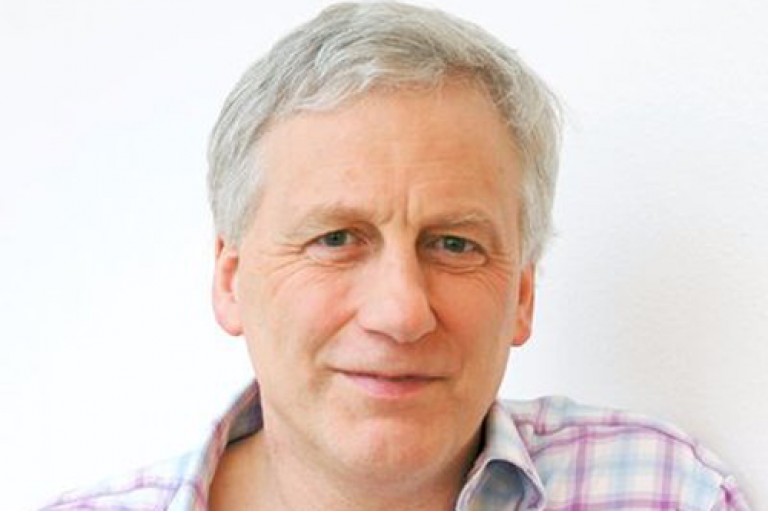Professor Sir Anthony Finkelstein and Lord Daniel Finkelstein OBE discuss leadership and their family’s miraculous story of surviving both the Holocaust and Soviet deportations at a City journalism event.
By Eve Lacroix (Senior Communications Officer), Published
“You couldn’t go through my family’s experience and think politics don’t matter,” said Lord Daniel Finkelstein OBE in a talk about family, storytelling and public service at City, University of London.
Hosted by City’s Department of Journalism, the event saw Daniel in conversation with his brother, and City’s President, Professor Sir Anthony Finkelstein. Topics included their family’s miraculous survival of the Holocaust.
The brothers discussed storytelling and Daniel’s critically acclaimed family memoir Hitler, Stalin, Mum and Dad: A Family History of Miraculous Survival, which was released earlier this year.
The event was moderated by Brett Spencer, Head of the Centre for Podcasting Excellence at City, who helped set up the new MA in Podcasting, which launched in September 2023 and is the first of its kind.
Around 200 students, academics, journalists and members of the public were in attendance.

On writing ‘Hitler, Stalin, Mum and Dad’
The Finkelstein family history is one of extraordinary escape under extreme adversity.
The book is one of trauma and survival, detailing the range of horrors inflicted on different relatives: some escaped the Nazis in Germany and the Netherlands, others were sent to concentration camps, while some experienced Soviet brutality in Poland.
Daniel is a columnist for The Times and was formerly its Executive Editor. As the family storyteller, he has always known he wanted to tell his family’s miraculous story, seeing it as his “responsibility”.
Their parents, Mirjam and Ludwik Finkelstein (who was a distinguished City Professor), were very open with the children in sharing their stories and did not want the experiences to ruin their lives.
“All survivor stories are by nature miraculous – the ordinary thing is to die. We were fortunate,” said Sir Anthony. “I knew Daniel would be able to do the story justice. We had a pile of anecdotes from our family, but they lacked a connecting thread which Daniel provided.”

As for getting the story down on paper, Daniel joked about the journalistic truism that to get anything written, you need a deadline.
He secured a book deal and a deadline from his publisher and spent the subsequent four years researching and writing the book, going into deep detail tracing their family’s journeys.
This makes the book unique: Daniel was able to figure out what had happened to his family members every day, down to tracing a passerby who had seen the cattle train which was transporting his aunt towards the Bergen-Belsen Nazi concentration camp.
While some facts were difficult to spend time with, Daniel felt he gained a little compensation by learning more about the family members they lost.
“When Anthony was awarded his knighthood, I knew the Soviets had totally failed,” Daniel said. “I was in the House of Lords and our sister Tamara was a permanent secretary and appointed Companion of the Order of the Bath (CB).”
Addressing the student journalists in the audience, he said: “Journalism is about knowing things. Being a good journalist is not about how good you are at writing. It’s about what information you can convey and what analysis you can provide.”
He suggested budding journalists invest the most of their energy into learning how to uncover new information.

A family legacy and looking to the future
Dr Alfred Wiener, their grandfather, set up the Wiener Holocaust Library, which is a leading archive on the Holocaust, the Nazi era and Jewish memory.
Today, all three of the Finkelstein children work in public service; Sir Anthony was previously the Chief Scientific Adviser for National Security, Daniel is a Conservative peer in the House of Lords and Tamara is the Permanent Secretary at the Department for Environment, Food and Rural Affairs.
“As a University, one of the important roles we have is to keep an account of what has happened,” Sir Anthony said. He was grateful to colleagues across City for striking a careful balance to secure the institution’s reputation as a place where freedom of speech is valued.
Daniel is also a co-host of the podcast ’How to Win an Election’. Looking ahead, he predicts the Tory party will lose the 2024 election. He believes both the Labour and the Conservative parties have moved closer to the centre, meaning next year’s election will be one between two parts of the centre.
He remains positive and believes deeply in the UK as a “uniquely liberal, stable country”. In contrast, he predicts the upcoming US elections will be “by far” the most important and potentially destabilising elections in 2024.



